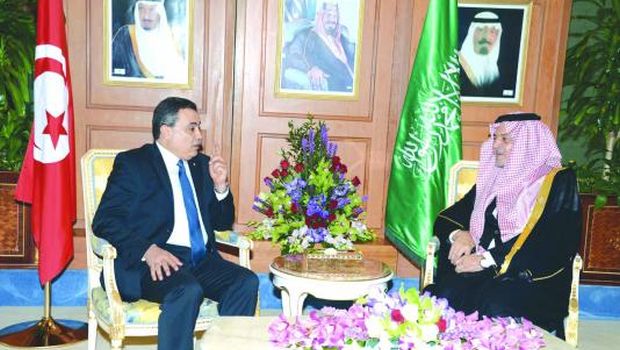
Saudi Foreign Minister Prince Saud Al-Faisal, right, meets with Tunisian Prime Minister Mehdi Jomaa in Riyadh, Saudi Arabia, on Monday, March 17, 2014. (SPA/Ahmad Azouz)
Riyadh, Asharq Al-Awsat— Saudi Foreign Minister Prince Saud Al-Faisal told Asharq Al-Awsat that there was no American mediation to resolve the crisis with Qatar, following the recalling of the ambassadors of Saudi Arabia, the UAE and Bahrain from Doha earlier this month.
This comes ahead of the scheduled visit to the region by US President Barack Obama at the end of March, with Saudi Arabia being one of the main stops of the tour.
Following a meeting in Riyadh with Tunisian Prime Minister Mehdi Jomaa on Monday, Prince Saud said there were no signs of a breakthrough in the crisis with Doha, and that the situation was unlikely to be resolved until the policies of “the state which caused the crisis” were revised, in reference to Qatar.
He added that recent events have shown the importance of cooperation and solidarity among the Gulf states, and that the idea of a closer Gulf union should not be dismissed.
Saudi Arabia, the UAE and Bahrain recalled their ambassadors from Qatar on March 5. They said the decision was due to the failure of all attempts to persuade Doha to adhere to an agreement on non-interference in the affairs of any of the other Gulf Cooperation Council (GCC) member states, either via direct action or the media.
The three states issued a joint statement which stressed their commitment to the welfare of all Gulf people, including Qataris, “who are an integral part” of the Gulf.
The statement claimed efforts were made to contact Qatar at all levels in order to agree on an approach which guaranteed progress under a united political framework based on the principles of GCC regulations and the agreements between its member states.
Observers say the three states recalled their ambassadors after growing anger at Qatar’s support for various branches of the Muslim Brotherhood, especially in Egypt, where Riyadh, Abu Dhabi and Manama supported its removal from power.
The presence of preachers sympathetic to the Brotherhood on Qatar’s state-funded Al-Jazeera satellite channel has also been a growing source of friction between Qatar and other members of the GCC.
Doha expressed regret at the decision to recall the ambassadors, but said it would not respond out of respect for the “fraternal values” among the Arab states of the Gulf.

Trackbacks/Pingbacks